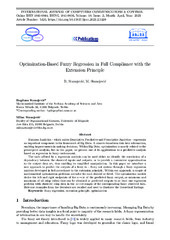Please use this identifier to cite or link to this item:
https://rfos.fon.bg.ac.rs/handle/123456789/2534Full metadata record
| DC Field | Value | Language |
|---|---|---|
| dc.creator | Stanojević, Bogdana | |
| dc.creator | Stanojević, Milan | |
| dc.date.accessioned | 2023-05-12T11:52:10Z | - |
| dc.date.available | 2023-05-12T11:52:10Z | - |
| dc.date.issued | 2023 | |
| dc.identifier.issn | 1841-9836 | |
| dc.identifier.uri | https://rfos.fon.bg.ac.rs/handle/123456789/2534 | - |
| dc.description.abstract | Business Analytics - which unites Descriptive, Predictive and Prescriptive Analytics - represents an important component in the framework of Big Data. It aims to transform data into information, enabling improvements in making decisions. Within Big Data, optimization is mostly related to the prescriptive analysis, but in this paper, we present one of its applications to a predictive analysis based on regression in fuzzy environment.The tools offered by a regression analysis can be used either to identify the correlation of a dependency between the observed inputs and outputs; or to provide a convenient approximation to the output data set, thus enabling its simplified manipulation. In this paper we introduce a new approach to predict the outputs of a fuzzy in - fuzzy out system through a fuzzy regression analysis developed in full accordance to the extension principle. Within our approach, a couple of mathematical optimization problems are solve for each desired alpha-level. The optimization models derive the left and right endpoints of the alpha-cut of the predicted fuzzy output, as minimum and maximum of all crisp values that can be obtained as predicted outputs to at least one regression problem with observed crisp data in the alpha-cut ranges of the corresponding fuzzy observed data. Relevant examples from the literature are recalled and used to illustrate the theoretical findings. | en |
| dc.publisher | CCC Publ-Agora Univ, Bihor | |
| dc.relation | Serbian Ministry of Science, Technological Development and Innovation through Mathematical Institute of the Serbian Academy of Sciences and Arts | |
| dc.relation | Faculty of Organizational Sciences, University of Belgrade | |
| dc.rights | openAccess | |
| dc.rights.uri | https://creativecommons.org/licenses/by-nc/4.0/ | |
| dc.source | International Journal of Computers, Communications and Control | |
| dc.subject | optimization | en |
| dc.subject | fuzzy regression | en |
| dc.subject | extension principle | en |
| dc.title | Optimization-Based Fuzzy Regression in Full Compliance with the Extension Principle | en |
| dc.type | article | |
| dc.rights.license | BY-NC | |
| dc.citation.issue | 2 | |
| dc.citation.other | 18(2): - | |
| dc.citation.rank | M22~ | |
| dc.citation.volume | 18 | |
| dc.identifier.doi | 10.15837/ijccc.2023.2.5320 | |
| dc.identifier.fulltext | http://prototype2.rcub.bg.ac.rs/bitstream/id/945/2530.pdf | |
| dc.identifier.rcub | conv_2902 | |
| dc.identifier.scopus | 2-s2.0-85152377365 | |
| dc.identifier.wos | 000967306100002 | |
| dc.type.version | publishedVersion | |
| item.cerifentitytype | Publications | - |
| item.fulltext | With Fulltext | - |
| item.grantfulltext | open | - |
| item.openairecristype | http://purl.org/coar/resource_type/c_18cf | - |
| item.openairetype | article | - |
| Appears in Collections: | Radovi istraživača / Researchers’ publications | |
SCOPUSTM
Citations
2
checked on Nov 17, 2025
Page view(s)
10
checked on Dec 28, 2025
Download(s)
2
checked on Dec 28, 2025
Google ScholarTM
Check
Altmetric
This item is licensed under a Creative Commons License


